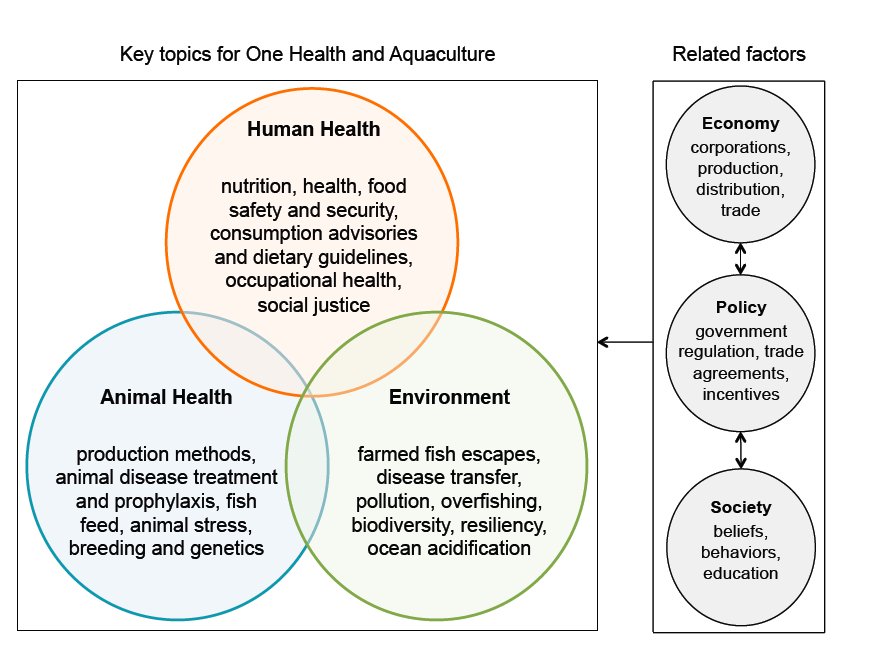
Aquaculture – potential role in enhanced public health
February 6, 2015
By Matt Jones
 Industry urged not to follow terrestrial agriculture
Industry urged not to follow terrestrial agricultureSeafood production through aquaculture is seen as an important piece for enhanced public health in the future. But the aquaculture industry is urged to not go down the same path as the terrestrial animal food production industries with respect to antibiotic use and other practices that can threaten food safety in an effort to maximize production. This is the message from Dr. Jillian Fry, Project Director for Public Health and Sustainable Aquaculture, Johns Hopkins Center for a Livable Future, and keynote speaker at the Tides Canada Innovation Workshop held October 26- 27, Vancouver BC.
The presentation was based on research by Dr. Fry and her associates which also resulted in the publication “Public Health Perspectives on Aquaculture” which states “increasing seafood consumption has been proposed as part of a strategy to combat the current non-communicable disease (NCD) pandemic..”. NCDs are health issues associated with lifestyle and include obesity, heart disease, and diabetes.
The shift to consuming a greater amount of terrestrial animal products and high calorie, low nutrient processed food has contributed to a high incidence of NCDs in many countries. Both the United Nations and World Health Organization have recognized the global threat of NCDs as a prominent cause of mortality in some countries. Seafood is recognized as a good source of lean protein, omega-3 fatty acids, and other nutrients that have a positive effect on human health.
As part of her keynote address, Dr. Fry presented facts that support a shift to aquaculture production including: over 80% of antibiotics in the US are sold for use in terrestrial animal production; it takes 4-7 kg of feed to produce 1kg of pork or beef; and 18% of all GHG emissions are produced by terrestrial animal agriculture.
With nearly half of all seafood consumed globally coming from aquaculture, the industry has a role in improving our health. “From the public health perspective, aquaculture has a beneficial role to play due to efficient use of resources and a positive nutritional profile of aquaculture products, as long as occupational safety and the use of antibiotics and other chemicals is properly regulated.” Dr. Fry stated. She noted that currently antibiotics are not usually used in aquaculture for growth enhancement and encouraged the aquaculture industry to not repeat the mistakes of the terrestrial animal production sector in respect to the use of antibiotics and veterinary chemicals, unsafe working conditions, and high nutrient pollution.
Aquaculture production compares favourably to animal agriculture in many aspects and aquaculture has the opportunity to replace other sources of animal protein with significant human health benefits. According to Dr. Fry, a significant challenge for the industry, and one that is currently being addressed through her work, is increasing aquaculture production to the levels needed to positively impact diets at a population level without threatening food safety and causing degradation of aquatic ecosystems.
To address the concerns, Dr. Fry and her colleagues advocate for the “One Health” concept to be applied to ensure the benefits of aquaculture production are realized on a population level.
“One Health” is an integrative approach where veterinary and human health experts collaborate to combat animal and human diseases. As stated in the publication, the approach is designed to “facilitate collaboration among stakeholders focused on increasing consumption of seafood and expanding aquaculture production, using methods that minimize risk to public health, animal health and ecology”. The multi-stakeholder system supports sustainable aquaculture production that meaningfully contributes to healthy human diets.
The Johns Hopkins Center for a Livable Future focuses on increasing awareness of public health issues by providing information, engaging health professionals and challenging regulators and food producers to adopt culture methods that improve public health. Dr. Fry’s work includes ongoing research into improving public health through responsible aquaculture and facilitating collaboration between public health professionals and the aquaculture industry.
For more information contact Dr. Jillian Fry at JFry3@jhu.edu.
— Linda Hiemstra
Publication reference: Public Health Perspectives on Aquaculture” Juan G. Gomez, Jillian P. Fry, Marcia Erazo and David C. Love. Curr Environ Health Rep (2014) 1:227-238.
Advertisement
- Aquaculture in Wisconsin is a growing industry
- Chris Beattie to lead Aquaculture Division Merck Animal Health





